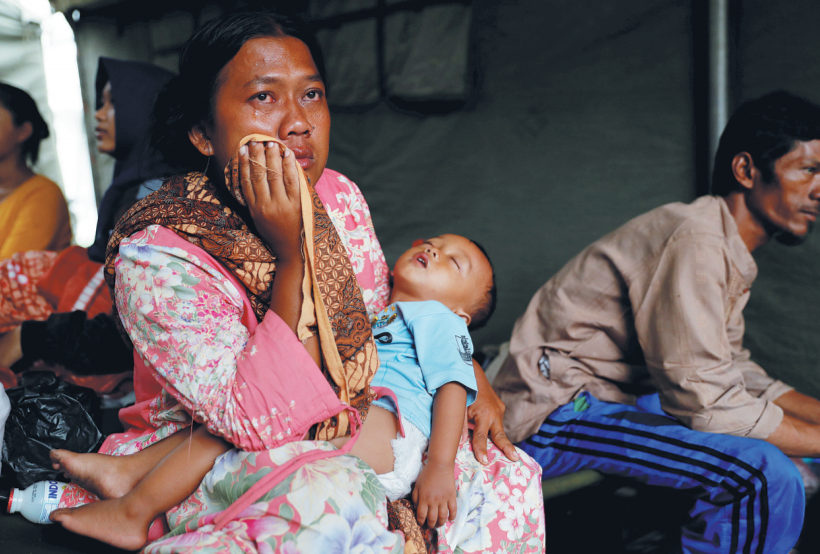Stealth tsunami struck like a ghost


Over 420 people killed and 1,485 injured after huge wave comes out of nowhere
TANJUNG LESUNG, Indonesia - As the white strobe lights flashed hypnotically, the band's lead singer screamed into the crowd: "We are! We are Seventeen! Seventeen!" He then let loose with a long note as the guitarist wailed behind him.
Some in the audience clapped as they sat at beachside tables covered in crisp white linens. Others walked casually across the grass. A small boy wandered among the tables, and a woman in a headscarf moved closer to the stage, her cell phone out and ready to capture the memory of this perfect night, a year-end concert at a popular resort on Java island's west coast.
Then, in a heartbeat, it was all gone.
A torrent of water emerged from the darkness like a monster, swallowing the stage and tossing band members, their instruments and all of their equipment into the audience. It was the last moment, caught on video, that most of them would ever know.
The tsunami that roared ashore from the Sunda Strait on Saturday night, killing more than 420 people and injuring over 1,400 on Java and Sumatra islands, was particularly cruel. It hit on a busy holiday weekend when many people were enjoying the warm night breeze on the beach under a full moon.
And unlike most big waves, which are typically portended by an earthquake's violent shaking, this was a stealth attack. There were no major ground convulsions, no sirens, no text message alerts.
Instead, a volcanic island with an ominous name-Anak Krakatau, or "Child of Krakatoa"-rumbled as it has been doing for months before a giant chunk of it apparently broke loose like a rock falling into a tub, silently unleashing disaster.
"The perfect atmosphere suddenly changed dramatically in just seconds!" recalled Mamad Setiadi, who had helped set up at the Tanjung Lesung Beach Club for the pop band Seventeen, which performed for employees of a state-owned electric company while a comedian simultaneously had audience members laughing in another area of the lawn.
"I saw the seawater suddenly rising and pushing everything on the stage, and I instinctively climbed a tree," he said. "From the top of that tree, I witnessed a horror that is difficult for me to describe in words. The seawater drowned everything… trees, cars, buses, benches-mixed with men, women and children! The sound of music turned into a hysterical scream!"
An estimated 500 guests and workers were milling about the resort's grounds when the wall of water surged forward, then sucked back to the sea with such force that survivors had to use all of their strength just to hold on. Seventeen's bass player, guitarist, drummer, road manager and technician were all killed. The lead singer, Riefian Fajarsyah, survived, but his wife, a backup singer, was missing. The comedian and his wife were also killed.
On Monday morning, rescuers found eight more bodies near the hotel, including a boy around 8 years old. Six soldiers in green fatigues carried a body bag through the pool area, the once-gleaming blue water now replaced with mud and debris.
Rescuers on Tuesday used heavy machinery, sniffer dogs, and special cameras to detect and dig bodies out of mud and wreckage along a 100 km stretch of Java's west coast and officials said the search area would be expanded further south.
Meanwhile, fears about a public health crisis come as desperately needed aid flowed in to a stretch of tsunami-struck coastline. Experts also have warned that more deadly waves could slam the stricken region.
Many of the more than 5,000 evacuees are too afraid to return home, fearing another disaster.
"I've been here three days," said Neng Sumarni, 40, who was sleeping with her three children and husband on the school's floor with some three dozen others.
"I'm scared because my home is right near the beach."
AP-REUTERS-AFP
































